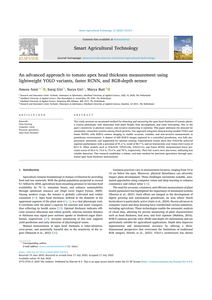Here, we delve into Demand Forecasting via Machine Learning, dissecting how to predict future demand using time-sensitive data. Westveer highlights key forecasting models, from the basic Simple Exponential Smoothing to the advanced SARIMA, applied to an electricity production dataset. The session, encapsulating the essence of data-driven forecasting, culminates in a compelling three-year predictive outlook, illustrating the transformative potential of machine learning in strategic planning and decision-making.
VIDEO
This study presents an automated method for detecting and measuring the apex head thickness of tomato plants, a critical phenotypic trait associated with plant health, fruit development, and yield forecasting. Due to the apex's sensitivity to physical contact, non-invasive monitoring is essential. This paper addresses the demand for automated, contactless systems among Dutch growers. Our approach integrates deep learning models (YOLO and Faster RCNN) with RGB-D camera imaging to enable accurate, scalable, and non-invasive measurement in greenhouse environments. A dataset of 600 RGB-D images captured in a controlled greenhouse, was fully preprocessed, annotated, and augmented for optimal training. Experimental results show that YOLOv8n achieved superior performance with a precision of 91.2 %, recall of 86.7 %, and an Intersection over Union (IoU) score of 89.4 %. Other models, such as YOLOv9t, YOLOv10n, YOLOv11n, and Faster RCNN, demonstrated lower precision scores of 83.6 %, 74.6 %, 75.4 %, and 78 %, respectively. Their IoU scores were also lower, indicating less reliable detection. This research establishes a robust, real-time method for precision agriculture through automated apex head thickness measurement.
DOCUMENT

The future energy system could benefit from the integration of independent gas, heat and electricity infrastructures. Such a hybrid energy network could support the increase of intermittent renewable energy sources by offering increased operational flexibility. Nowadays, the expectations on Natural Gas resources forecast an increase in the application of Liquefied Natural Gas (LNG), as a means of storage and transportation, which has a high exergy value. Therefore, we analyzed the integration of decentralized LNG regasification with a Waste-to-Energy (W2E) plant for a practice-based case to get an idea on how it might affect the balancing of supply and demand, under optimized exergy efficient conditions. We compared an independent system with an integrated system that consists of the use of the LNG cold to cool the condenser of the W2E plant, as well as the expansion of the regasified LNG in an expander, using a simplified deterministic model based on the energy hub concept. We use the hourly measured electricity and heat demand patterns for 200 households with 35% of the households producing electricity from PV according to a typical measured solar insolation pattern in The Netherlands. The results indicate that the integration affects the imbalance for electricity and heat compared to the independent system. If the electricity demand is met, both the total yearly heat shortage and heat excess are reduced for the integrated system. If the heat demand is met, the total yearly electricity shortage is also reduced (with 100 MWh). However, the total yearly electricity excess is then increased (with 300 MWh). We observed that these changes are solely due to the increase in exergy efficiencies for heat and electricity of the W2E Rankine cycle. The efficiency of the expander is too low to offer a significant contribution to the electricity demand. Therefore, future research should focus on the affect that can be obtained by to other means of integration (e.g. Organic Rankine Cycle and Stirling Cycle).
DOCUMENT